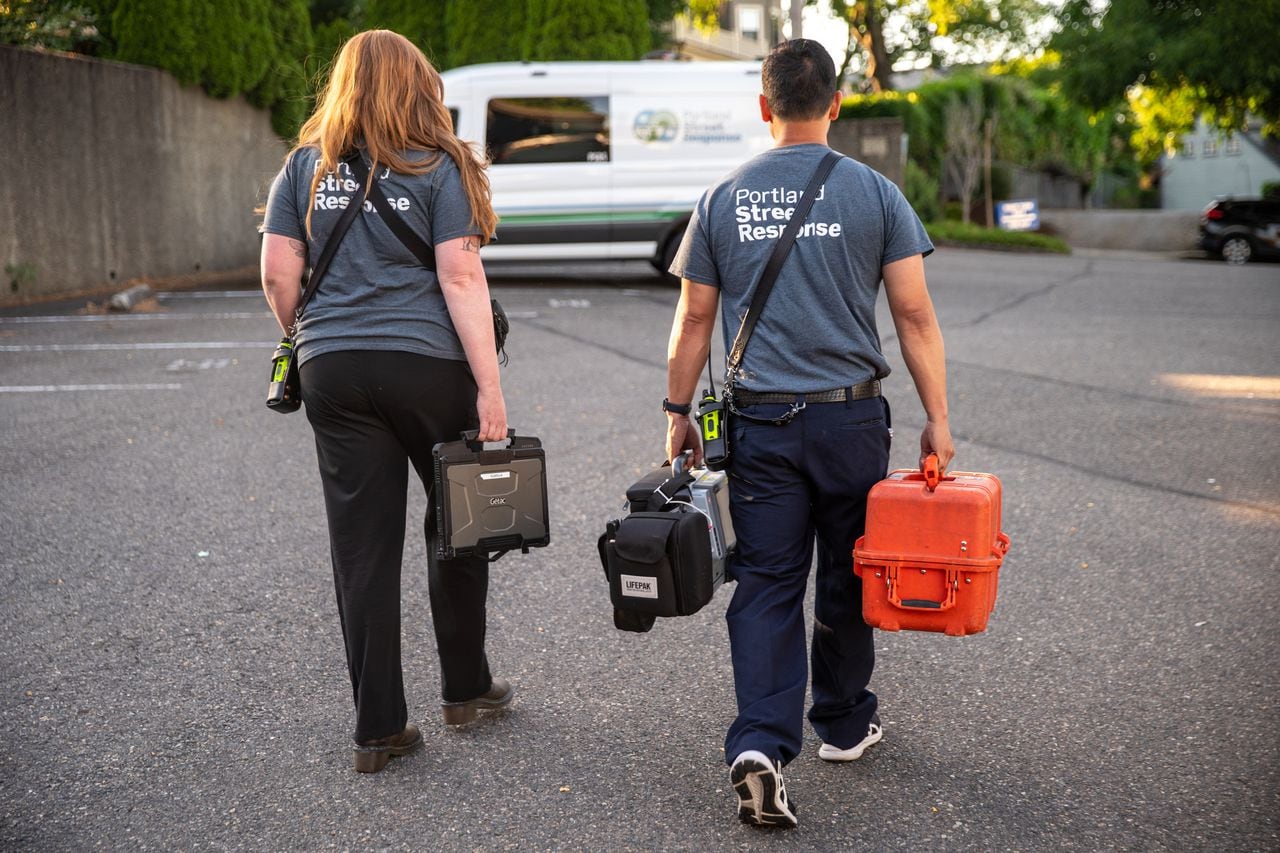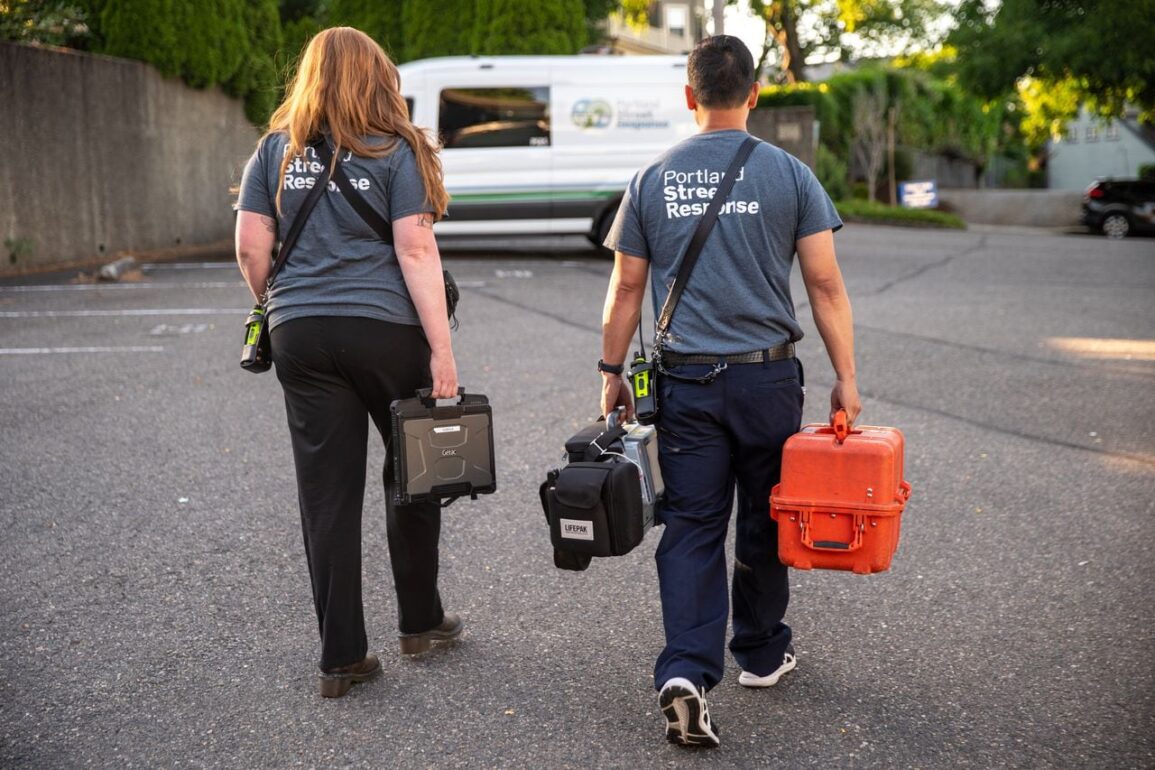
As Oregon wrestles with how to best treat patients with severe mental illness, a group of Portland-area mental health leaders said involuntary treatment is an important piece of the puzzle — but it’s unclear what the best place is for those patients.
In a wide-ranging panel discussion held by the Oregon Health Forum on Wednesday, five community leaders talked about the need for stabilization centers, adding to the supply of behavioral health housing and providing social services for those with mental illness.
The speakers, which included a county commissioner, a judge and the interim director of Portland’s mental health crisis service, agreed that the current system of funneling patients through the criminal justice system before they can get mental health treatment is unsustainable.
Oregon lacks places for patients in crisis, panelists said, particularly those who can’t advocate for themselves.
Doctors and county health officers can order people who are a danger to themselves or others held involuntarily for up to 72 hours, beyond which a judge must weigh in. In practice, though, there are few facilities to house people held for treatment.
The Oregon State Hospital in Salem, the state’s largest psychiatric facility, now rarely accepts those patients because it is full of patients who arrived through the criminal justice system, found guilty except for insanity or unable to assist in their own trial.
Instead, patients in the midst of an acute mental health crisis often stack up in medical hospitals, which aren’t equipped to care for them.
“The largest involuntary treatment system in Oregon is the jails and prisons,” said Robin Henderson, the chief executive of behavioral health for Providence Oregon. “It’s a traumatizing place, it’s not a good situation.”
Increasingly privatized psychiatric services, Henderson said, have made patient beds are harder to find.
“There’s just no give in the system,” Henderson said.
Multnomah County Circuit Court Judge Nan Waller presides over the county’s mental health court, and also oversees hearings for people who are charged with crimes but deemed mentally unfit to defend themselves in court.
Waller said in her years on the bench, she’s seen patients deep in the throes of mental illness or addiction who are struggling to keep up with treatment. A few have asked to be put in jail, while others simply languish on the streets.
“I work in a system of mandates,” she said. “There are points where people really don’t have the ability, and to say we are just going to let people on the street and say we’ll let them make a decision, in my view that’s not humane.”
She urged the creation of an alternative to jail, a place where people can be dropped off if they’re in crisis and then placed somewhere else, whether that’s substance abuse treatment or psychiatric care.
Officials from groups in Multnomah County, including Waller, spent four years planning a Portland Crisis & Sobering Center, which would focus on intoxicated people with co-occurring mental health issues. As they sobered, medical workers could assess them and connect them to treatment or services.
But that effort collapsed after it was rejected by a board distributing funds for treatment under the drug decriminalization Measure 110. The county government is now pursuing a sobering center but has yet to find funding for it. The county also provided $7 million for a separate 20-bed stabilization center.
Waller said people with mental illness must be able to seek treatment regardless of whether they face criminal charges or the severity of their illness.
“Those in the criminal justice system with behavioral health issues, sometimes they’re literally left out in the cold when housing or programs reject them,” she said. “The stigma of criminal charges on top of the stigma of mental illness really puts people in the criminal justice system at a great disadvantage.”
Lielah Leighton, a licensed clinical social worker and the interim director of Portland Street Response, said there’s a time and place for restrictive interventions, such as committing someone to psychiatric care who can’t make their own decisions.
But, she said, many patients might be more inclined to seek treatment if their basic needs, such as shelter and physical safety, were addressed.
“I’m of the opinion that voluntarily selecting into care starts you off on the right foot,” Leighton said. “But what’s more interesting to me is being realistic about what we’re asking people to consent to. It might sound like a great idea to us to help them get to an emergency room, but what does that mean for their belongings, their safety? Are they going to have to return after dark? Be discharged in two hours? So many of their complaints are driven by these unmet basic needs.”
Jonathan Mroz, the communications specialist for Central City Concern, said struggling to meet those basic needs was a barrier in his own recovery.
A few years ago, Mroz said, he began using drugs after traumatic events in his personal life. He ended up living on the street in Old Town in what he described as a “constant state of hypervigilance.”
“Homelessness is deeply traumatic even without drugs,” he said. “An endless cycle emerged. Losing a backpack, losing a cell phone, getting all the things back that make us a human being, that takes a lot of time. And it places the burden on the individual to be sane enough to get help.”
He cited the severe lack of psychiatric beds and the residential facilities that patients need afterward, as well as the need for a place for patients to simply get off the streets while they stabilize.
“We’re creating an endless cycle of abandonment at that point,” he said.
As panelists considered immediate solutions, some highlighted the need for a long-term plan.
“We don’t have a plan or a functional system,” said Multnomah County Commissioner Sharon Meieran, who also works as an emergency room doctor. “Unless we have that, we’re just going to be throwing good money after bad.”
Meieran suggested someone who can coordinate mental health efforts between the state and counties.
“We don’t need any more studies, meetings, task forces or committees,” she said. “We need someone to bring it together and connect the dots, leading us forward.”
—Jayati Ramakrishnan; jramakrishnan@oregonian.com
This post was originally published on this site be sure to check out more of their content.







